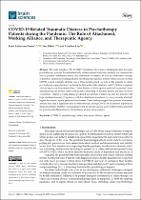Please use this identifier to cite or link to this item:
https://hdl.handle.net/20.500.12202/9319| Title: | COVID-19 related traumatic distress in psychotherapy patients during the pandemic: The role of attachment, working alliance, and therapeutic agency |
| Authors: | Aafjes-Van Doorn, Katie Békés, Vera Luo, Xiaochen 0000-0003-2584-5897 |
| Keywords: | COVID-19 psychotherapy online attachment alliance agency |
| Issue Date: | 2021 |
| Citation: | Aafjes-Van Doorn, K., Békés, V., & Luo, X. (2021). COVID-19 Related traumatic distress in ps/ychotherapy patients during the pandemic: The role of attachment, working alliance, and therapeutic agency. Brain Sciences, 11(10), 1288. https://doi.org/10.3390/brainsci11101288 |
| Series/Report no.: | Brain Sciences;11(10) |
| Abstract: | Abstract The early months of the COVID-19 pandemic have been a challenging time for many psychotherapy patients. To understand why certain patients were more resilient, we examined the role of patients’ attachment anxiety and attachment avoidance, as well as collaborative therapy experiences (perceived working alliance and therapeutic agency) in their online sessions on their COVID-related traumatic distress over a three-month period. A total of 466 patients in online psychotherapy completed a survey during the first weeks of the pandemic, and 121 of those completed a follow-up survey three months later. Lower distress at follow-up was predicted by patients’ lower attachment anxiety in their online sessions after controlling for baseline distress and time of survey completion. Higher working alliance predicted less distress at follow-up only for patients with high attachment anxiety. For patients with low attachment avoidance (i.e., more securely attached), higher therapeutic agency predicted less distress. These findings suggest that patients’ attachment anxiety may play a significant role in online therapy during COVID-19 in patient’s experienced traumatic distress, and that working alliance and therapeutic agency may be differentially important for patients with different levels of attachment anxiety and avoidance. |
| Description: | Scholarly article / Open access |
| URI: | https://doi.org/10.3390/brainsci11101288 https://hdl.handle.net/20.500.12202/9319 |
| Appears in Collections: | Ferkauf Graduate School of Psychology: Faculty Publications |
Files in This Item:
| File | Description | Size | Format | |
|---|---|---|---|---|
| Aafjes-Van Doorn COVID-19 2021 brainsci-11-01288-v4.pdf | 391.73 kB | Adobe PDF |  View/Open |
This item is licensed under a Creative Commons License

